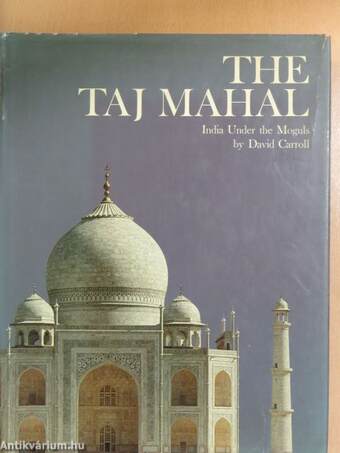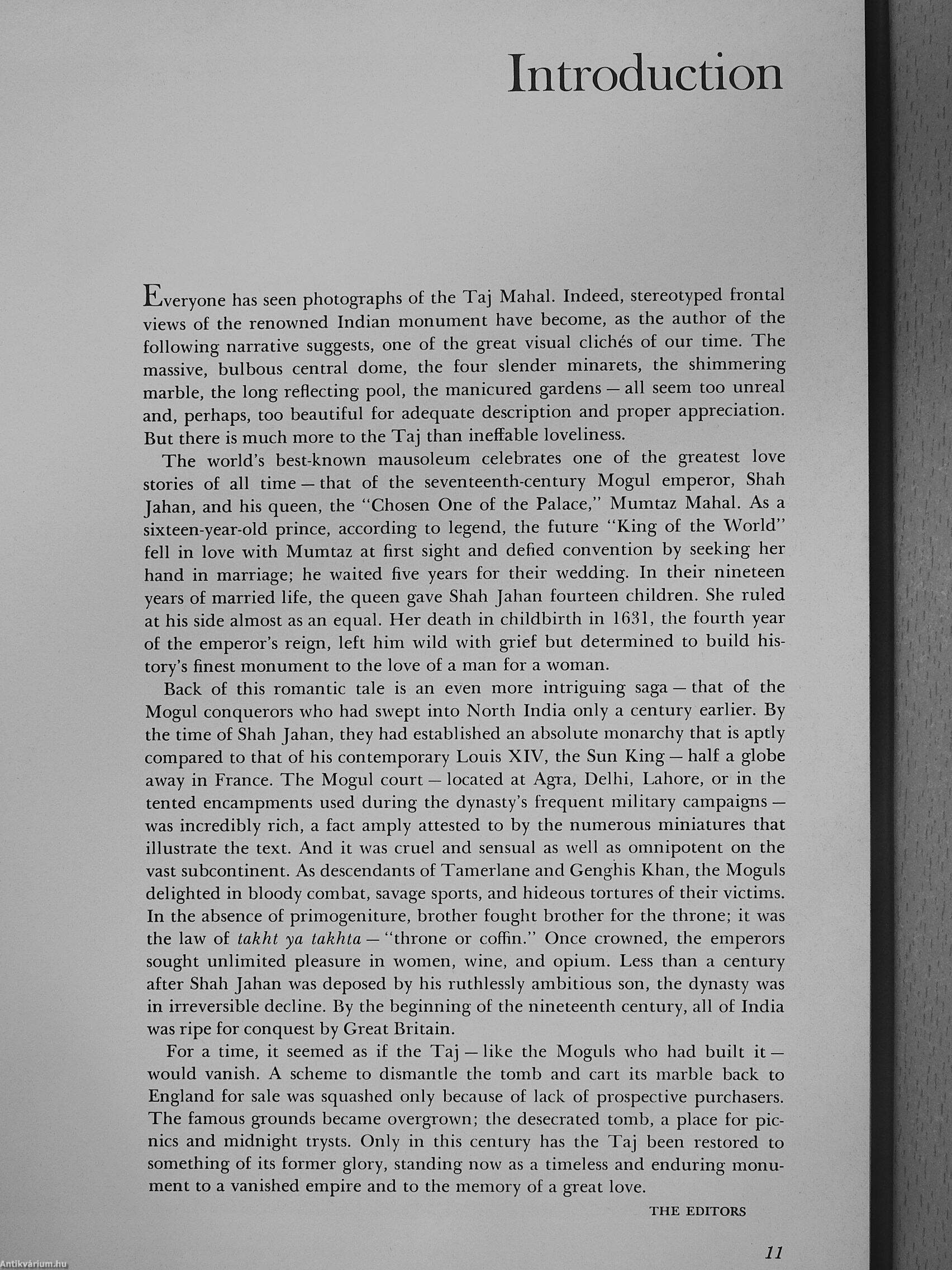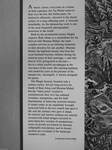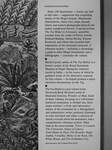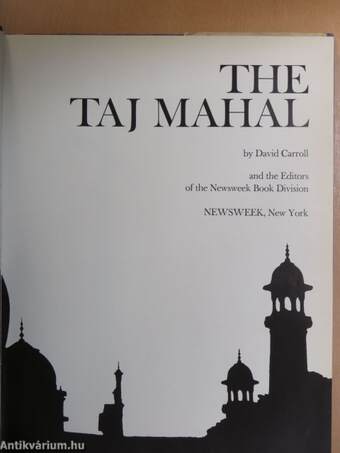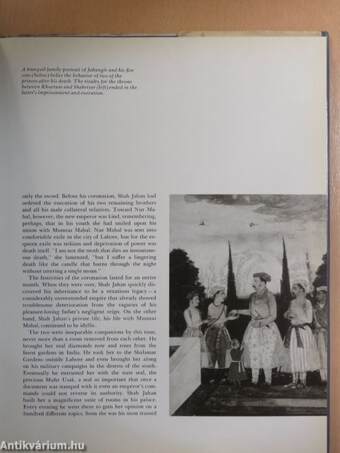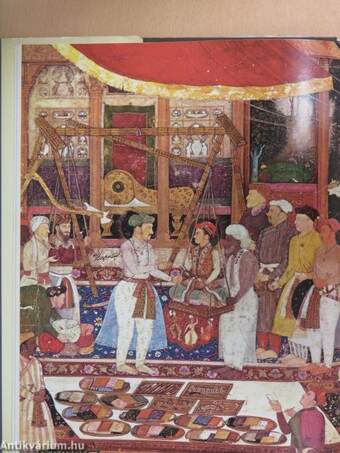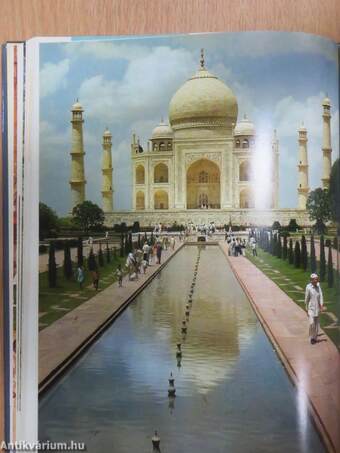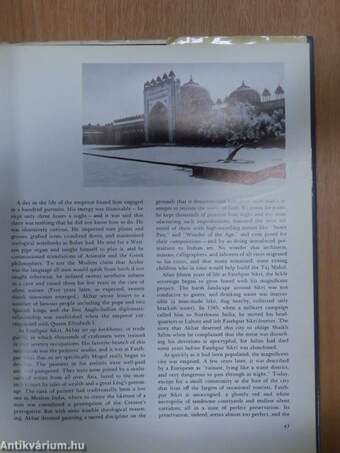1.067.339
kiadvánnyal nyújtjuk Magyarország legnagyobb antikvár könyv-kínálatát

VISSZA
A TETEJÉRE
JAVASLATOKÉszre-
vételek
The Taj Mahal
India Under the Moguls
| Kiadó: | Newsweek Book Division |
|---|---|
| Kiadás helye: | New York |
| Kiadás éve: | |
| Kötés típusa: | Vászon |
| Oldalszám: | 172 oldal |
| Sorozatcím: | |
| Kötetszám: | |
| Nyelv: | Angol |
| Méret: | 30 cm x 23 cm |
| ISBN: | 0-88225-024-8 |
| Megjegyzés: | Színes és fekete-fehér fotókkal, reprodukciókkal. További kapcsolódó személyek a könyvben. |
naponta értesítjük a beérkező friss
kiadványokról
naponta értesítjük a beérkező friss
kiadványokról
Előszó
TovábbFülszöveg
A WHITE JEWEL ENCLOSED in a frame of dark cypresses, the Taj Mahal seems to float over the hot, flat Indian plain. Its distinctive silhouette, mirrored in the placid surface of a long reflecting pool, is instantly identifiable, for the shimmering tomb is one of the most frequently photographed structures in the world.
Built by the seventeenth-century Mogul emperor Shah Jahan as a mausoleum for his beloved wife Mumtaz Mahal, the tomb complex survives as an enduring testament to their devotion for one another. Mumtaz Mahal, the highborn beauty who bore her royal husband fourteen children during the nineteen years of their marriage — and who died in 1631 giving birth to the last — lies in a white marble sarcophagus at the very heart of the tomb. Her adoring husband, who ended his years as the prisoner of his usurper-son, Aurangzeb, is buried alongside his queen.
The Mogul dynasty, founded only a century earlier, did not long survive the deaths of Shah Jahan and Mumtaz Mahal, but... Tovább
Fülszöveg
A WHITE JEWEL ENCLOSED in a frame of dark cypresses, the Taj Mahal seems to float over the hot, flat Indian plain. Its distinctive silhouette, mirrored in the placid surface of a long reflecting pool, is instantly identifiable, for the shimmering tomb is one of the most frequently photographed structures in the world.
Built by the seventeenth-century Mogul emperor Shah Jahan as a mausoleum for his beloved wife Mumtaz Mahal, the tomb complex survives as an enduring testament to their devotion for one another. Mumtaz Mahal, the highborn beauty who bore her royal husband fourteen children during the nineteen years of their marriage — and who died in 1631 giving birth to the last — lies in a white marble sarcophagus at the very heart of the tomb. Her adoring husband, who ended his years as the prisoner of his usurper-son, Aurangzeb, is buried alongside his queen.
The Mogul dynasty, founded only a century earlier, did not long survive the deaths of Shah Jahan and Mumtaz Mahal, but the "white jewel" created to commemorate their love has endured invasions, usurpations, and the bold depredations of latter-day souvenir hunters. It stands today as an exquisitely wrought memorial both to the love match that gave it life and the artisans who gave it shape. Its exterior and interior surfaces are entirely covered with inlaid designs executed in some thirty-five varieties of semiprecious stone; its portals are framed by intricate calligraphic inscriptions; and its formal gardens are a triumph of the landscape architect's craft.
(continued on back flap)
vri
(continued from front flap)
Some 120 illustrations — nearly one half in full color — supplement this compelling history of the Mogul dynasty. Manuscript illuminations, objets d'art, maps, dynasty charts, and modern photographs taken by the author complement the text. A special section, The Taj Mahal in Literature, assembles excerpts from the works of Edwin Arnold, Rudyard Kipling, Aldous Huxley, Eleanor Roosevelt, and others who recorded their impressions of the renowned memorial. A reference section — including a chronology, a guide to other Mogul monuments, and a
bibliography — concludes the volume. ¦
David Carroll, author of The Taj Mahal, is a former curator of the Royal Katmandu Museum in Nepal. During his extensive travels in India — in the course of which he gathered much of the illustrative material for this volume — he helped produce a major
television documentary on the Taj. ¦
The Taj Mahal is a new volume in the Newsweek Book Division's series of illustrated histories, Wonders of Man. Each of these volumes, focusing on a well-known historical monument, is divided into three major sections; a lively and informative history of the monument by a distinguished and authoritative writer, profusely illustrated in color and black and white; a selection of literary excerpts about the monument; and a comprehensive reference section. Other titles in the series include: Tower of London, The Colosseum, Statue of Liberty, Notre-Dame de Paris, The Kremlin, Hagia Sophia, Versailles, Dome of the Rock, The White House, and The Forbidden City.
Jacket illustration: The Taj Mahal (tiaviti Carroll) Vissza
Témakörök
- Idegennyelv > Idegennyelvű könyvek > Angol > Művészetek > Építészet
- Idegennyelv > Idegennyelvű könyvek > Angol > Művészetek > Művészettörténet, általános
- Idegennyelv > Idegennyelvű könyvek > Angol > Útikönyvek
- Idegennyelv > Idegennyelvű könyvek > Angol > Művelődéstörténet
- Művelődéstörténet > Civilizációtörténet > Keleti
- Művelődéstörténet > Kultúra > Története
- Helytörténet > Külföldi > Egyéb
- Helytörténet > Helyismeret > Várak, építmények
- Útikönyvek > Ázsia
- Útikönyvek > Idegennyelvű útikönyvek > Angol
- Útikönyvek > Utazás, turizmus
- Útikönyvek > Természetjárás, túrák > Városnézés
- Művészetek > Művészettörténet általános > Kontinensek művészete > Ázsia > Egyéb
- Művészetek > Művészettörténet általános > Idegen nyelv > Angol
- Művészetek > Művészettörténet általános > Korszakok, stílusok > XVI. század, újkor > Egyéb
- Művészetek > Építészet > Kontinensek szerint > Ázsia > Egyéb
- Művészetek > Építészet > Idegen nyelv > Angol
- Művészetek > Építészet > Műemlékek > Vallási
- Művészetek > Építészet > Építészettörténet > Külföldi
Megvásárolható példányok
Nincs megvásárolható példány
A könyv összes megrendelhető példánya elfogyott. Ha kívánja, előjegyezheti a könyvet, és amint a könyv egy újabb példánya elérhető lesz, értesítjük.



